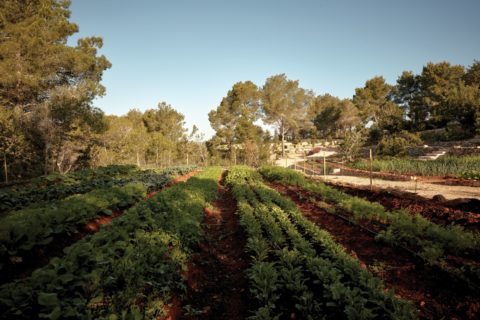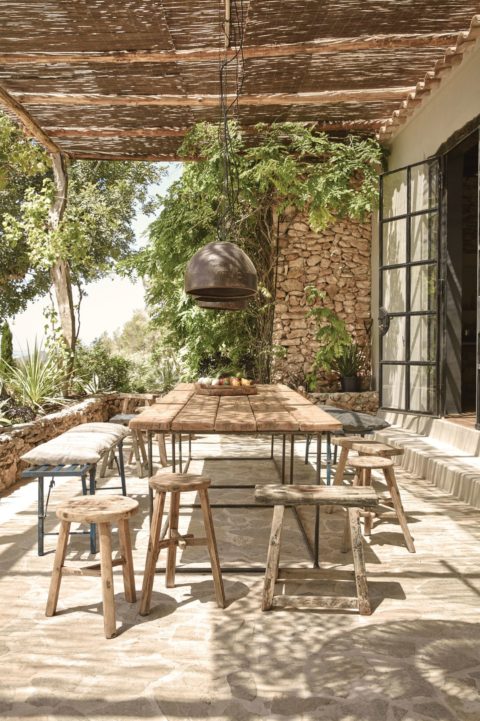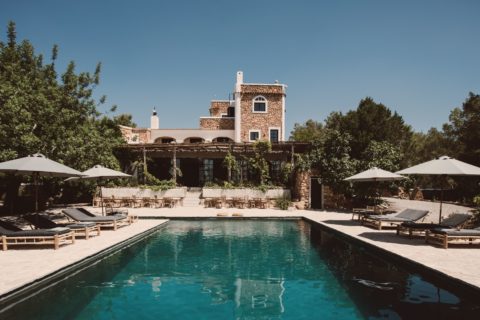La Granja is a Much Needed Escape from Ibiza’s Club Scene
The 200-year-old farmhouse turned luxury hotel embraces a slower pace than the island’s usual hyped-up VIP culture.
Ibiza is everything its hedonistic reputation would have you believe. I first visited the island in 2009, and during my weekend there, I went to Space Opening Fiesta, the legendary summer launch party for one of the biggest nightclubs on the island—think thousands of shiny, happy people dancing from two in the afternoon until, well, it was time to head to another club, DC-10, for another 12 hours of the same.
Though it took me a year to get used to calling it “Ih-bee-tha,” like the locals and British do, I fell instantly for its bohemian vibe and shimmering blue waters. But veering off the club-trodden pathways and into the island’s rural interior yields sublime rewards of its own. Here is where the La Granja Ibiza—a centuries-old farmstead turned hotel surrounded by fragrant olive, fig and almond trees—can be found.

The hotel, which opened in 2016, is a welcome respite after a Friday-night budget flight to Ibiza. It’s also a nice alternative to the hyped-up VIP culture that now pervades much of the island. La Granja is well hidden from the main road (which makes it an ideal hideaway for the glitterati)—so well hidden, in fact, that we circled its 10 hectares twice before realizing our error and eventually turning in. You’ve been warned.
With just 10 rooms and a large communal dining area, settling in at La Granja is easy. The 200-year-old farmhouse was restored by German-based Dreimeta design studio, holding onto architectural elements such as the thick walls (which kept rooms cool before air conditioning), archways and weather-worn wood-beamed ceilings while introducing contemporary components like the hammered-iron doorknobs and fixtures. Elegant, pared-down and luxurious, La Granja feels decidedly grown-up (no more youth hostels for this youth!) and deserving of its status as a Design Hotels-branded project.

Guests are free to explore the farmland, so we visit Coco Chanel the pig and Luna the pony and take a self-guided tour through rows of carrots and tomatoes—all meticulously planted and maintained by master farmer Andy Szymanowicz. Born in New Jersey, Szymanowicz spent 20 years organic farming in the States before moving to Ibiza in 2016, charged with redesigning and reinvigorating La Granja.
Now, just two summers in, the hotel is already one of Ibiza’s most sustainable farm-to-table resorts. “Our target this year is to be 50 to 60 per cent self-sufficient,” says marketing and communications manager Noémie Lavatelli. “That means 50 to 60 per cent of what’s in the kitchen should be from the farm, while the remainder is supplied locally.” To date, the hotel is halfway there. It produces seven varieties of tomatoes, three types of eggplant and dozens of fruits and vegetables—peppers, onions, garlic, avocados, beets, carrots, zucchini, kale, apples, peaches, watermelons, lemons, oranges, blueberries and herbs ranging from cilantro and oregano to thyme and Thai basil. Everything makes its way into the kitchen, where chef José Catrimán prepares it for the table. Our breakfast is fresh fruit, scrambled eggs and crusty seeded bread with tomato, avocado and Jamón Ibérico. For dinner one night, we’re served roast chicken with smashed potatoes and roasted onions, carrots and beets from the garden; the next night, a whole sea bream is wrapped with tomatoes and olives in fig leaves and roasted on an outdoor grill.

If a goal of 50 to 60 per cent self-sufficiency seems modest, think carefully about what you personally consume every day and then factor in that the island’s tap water is non-potable. Using and providing bottled water for its guests reduces La Granja’s self-sufficiency score automatically. And for now, olive oil, bread, rice, fish, meat, eggs, dairy, coconut water, coffee, tea and alcohol are all sourced externally. Lavatelli says there are plans to introduce chickens, goats and bees, but for now, they must be obtained elsewhere, although everything is 100 per cent organic. “The ability to be self-sufficient also depends on what you want to offer your guests,” she adds.
Turns out, we end up staying at La Granja for two full days. No clubs, no beaches—a testament to how amazing the farmhouse already is.








